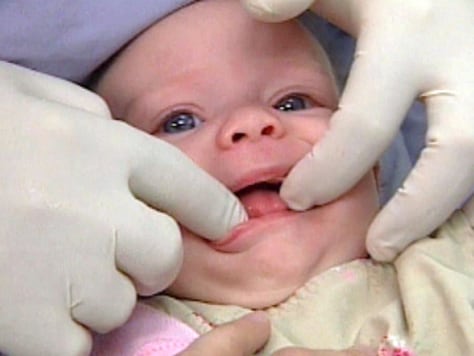Few children receive dental care before recommended age of 1 year
Less than one per cent of healthy urban children surveyed in Toronto had received dental care by the recommended age of 12 months and less than two per cent had seen a dentist by the age of 24 months. Children most susceptible to cavities were least likely to receive early dental care, according to the study by Dr. Jonathon Maguire, a pediatrician and researcher at St. Michael’s Hospital.
Of the 2,505 children around 4 years of age who were surveyed from 2011-13, 39 per cent had never been to a dentist. The children were part of TARGet Kids! (The Applied Research Group for Kids!), a unique collaboration between doctors and researchers from St. Michael’s Hospital and The Hospital for Sick Children. The program follows children from birth with the aim of preventing common problems in the early years and understanding their impact on health and disease later in life.
Dr. Maguire’s study was published today in the journal Pediatrics.
The study found never having been to a dentist was associated with younger age, lower family income, prolonged bottle use and higher daily intake of sweetened drinks such as juice. With each one-cup increase in the amount of sweetened drinks consumed daily, the odds of never having visited a dentist increased by 20 per cent.
Of children who had visited a dentist, 24 per cent had at least one cavity.
Dr. Maguire said prolonged bottle use, especially at night, and sweetened drinks are suspected risk factors for cavities because the carbohydrates in the beverages promote the growth of the bacteria that causes cavities.
 Among children who had been to a dentist, older age, lower family income and East Asian maternal ancestry were also associated with having one or more cavities.
Among children who had been to a dentist, older age, lower family income and East Asian maternal ancestry were also associated with having one or more cavities.
Cavities can cause not just pain in children but also contribute to feeding problems, poor nutritional status and behavioural problems, Dr. Maguire said.
He said previous studies have found that children who receive preventive dental care in the first year of life have less dental disease, are less likely to require restorative or emergency treatment and have lower dental-related health care costs - particularly among high-risk populations. Barriers to dental care for families with young children may include financial cost, access to transportation, school absence policies and a belief that dental health may not be important to overall well-being, he said.
“It’s one thing for primary health care providers to be recommending early preventive dental care but for many families this is unrealistic,” said Dr. Maguire. “Publically funded universal early preventive dental care just makes sense”
Dental care is not part of Canada’s universal health care system and, as in the United States, it is primarily provided in private practice settings on a free-for-service basis.
###
Embargoed until 0001 a.m., Monday, May 5, 2014, time set by journal. Dr. Maguire is available for interviews until 2 p.m. today (Wednesday, April 30), from 11:30-1 on Thursday and on Friday afternoon.
About St. Michael’s Hospital
St Michael’s Hospital provides compassionate care to all who enter its doors. The hospital also provides outstanding medical education to future health care professionals in 27 academic disciplines. Critical care and trauma, heart disease, neurosurgery, diabetes, cancer care, care of the homeless and global health are among the Hospital’s recognized areas of expertise. Through the Keenan Research Centre and the Li Ka Shing International Healthcare Education Centre, which make up the Li Ka Shing Knowledge Institute, research and education at St. Michael’s Hospital are recognized and make an impact around the world. Founded in 1892, the hospital is fully affiliated with the University of Toronto.
Media contacts
For more information, or to arrange an interview with Dr. Maguire, contact:
Leslie Shepherd
Manager, Media Strategy
St. Michael’s Hospital
416-864-6094
.(JavaScript must be enabled to view this email address)
Inspired Care. Inspiring Science